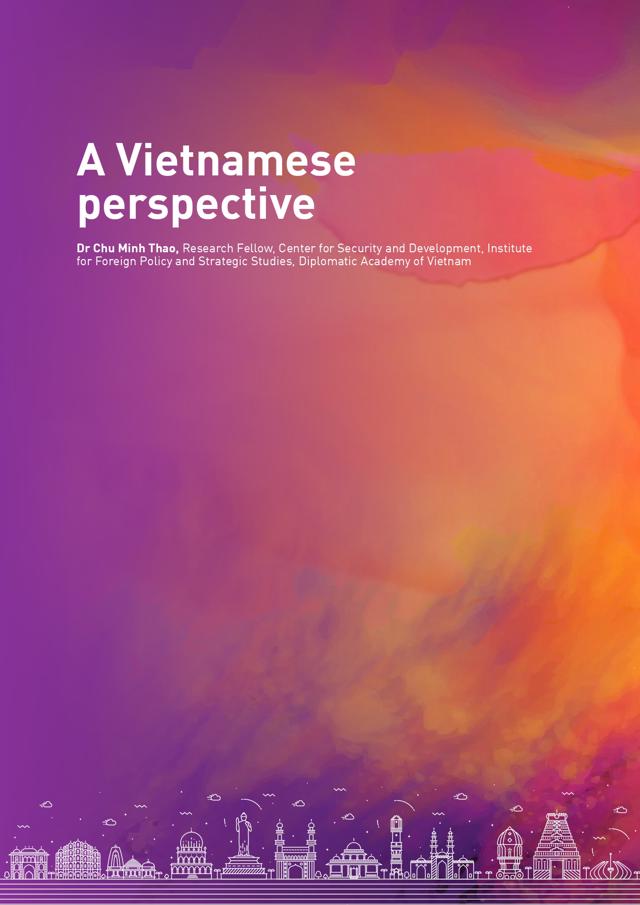

The issue of India's potential accession to APEC has been raised for some time. This is because India- one of the world's fastest growing major economies - is a major contributor to economic growth in the APEC region, and also balances China's growing geostrategic influence. However, when analyzed through strategic, political and economic perspectives, India's would-be APEC accession does poses some complications. This is especially so for Vietnam, an emerging economy and active political and trade player in the region and the world.

Vietnam and India in APEC
The issue of India’s potential accession to APEC has been raised for some time. This is because India – one of the world’s fastest growing major economies – is a major contributor to economic growth in the APEC region, and also balances China’s growing geostrategic influence. However, when analysed through strategic, political and economic perspectives, India’s would-be APEC accession does pose some complications. This is especially so for Vietnam, an emerging economy and active political and trade player in the region and the world.
From India’s non-membership to possible membership of APEC
The main reasons for India’s exclusion from APEC relate to its historical pattern of only partial integration with the regional and global economy. This dynamic is changing, with Indian policy determined to strengthen economics ties and connectivity with the Asia Pacific region. This includes India’s expression of interest to join APEC in 2015.49 The rational for India’s accession to APEC includes the potential economic benefits it would offer: for India, the Indo-Pacific region and the international economy. Its membership would be an important step towards an expanded geographic scope regional integration, and contribute to more dynamic environment for APEC economic growth.50 India’s accession has been supported by the United States, Japan, Australia and Papua New Guinea. For the US, India’s accession aligns with its policy of a “free and open Indo-Pacific”, a vision articulated by President Donald Trump in his APEC 2017 speech in Vietnam. The US also appreciates that the Indian economy is becoming a more dynamic player in Asia’s economic networks. Similarly, former Prime Minister of Australia Kevin Rudd publicly expressed support for Indian membership in 2015, indicating that India could be a new growth driver for the APEC bloc.51 Vietnam’s perspective must be understood in the context of its strong bilateral relationship with India, as well as its multilateral relationships in a fast-changing regional and global context. India is positioned in Vietnam’s foreign policy as a traditional friend, a large and major country, and one of Vietnam’s priority partners. Vietnam has deep interests in and benefits from maintaining good relations with India. This includes offering support for India’s strategic interests, as Vietnam also enjoys India’s support for Vietnam’s critical interests. Yet there are also some concerns which Vietnamese policymakers need to balance.
Vietnamese interests in Indian APEC membership
Vietnam’s policy towards Indian accession is strongly shaped by Vietnam’s interests in maintaining a comprehensive relationship with India, continuing a history of strong bilateral diplomatic cooperation. Politically, India has been Vietnam’s traditional loyal ally in all major fields. For instance, India supported Vietnam in its fight against French colonial rule, and was a supporting voice in international organisations against the US in the Vietnam War. India was one the first countries that recognised and established diplomatic relationships with the Democratic Republic of Vietnam, and India condemned China’s invasion of Vietnam in 1979. In recent years, India has shared Vietnam’s position in the South China Sea, supporting the peaceful resolution of territorial disputes, advocating for compliance with international law (especially the United Nations Convention on Law of the Sea), and supporting regional commitments such as the Declaration of Conduct and a Code of Conduct.52 Given India also has territorial disputes with China, it is unsurprising India and Vietnam share the same values and interests in this space. This history of good political relations has facilitated the process of India and Vietnam first upgrading bilateral relationships to the Strategic Partnership level in 2007, and to a Comprehensive Strategic Partnership in 2016. Along with China and Russia, this Comprehensive Strategic Partnership with India is Vietnam’s highest level of bilateral diplomatic relationship. Given this traditional context, it would be easy to understand Vietnam would support India as a close and traditional ally in all fields - bilaterally and in international organisations. At the regional and international level, Vietnam and India cooperate in various regional initiatives, particularly for political reasons. For Vietnam, bringing the ‘big elephant’ India into the room is a good balance to China. This is fortunately aligned to ASEAN’s interest and recent efforts to institutionalise closer ties with India. The reason ASEAN invited India to join RCEP trade negotiations was more for political interests than economic interests: ASEAN is comprised of relatively smaller economies and cannot compete with China economically and politically. Thus, despite the challenges of India’s often protectionist economic policies, which risks delaying negotiations and constraining progress, India was still invited by ASEAN to join hands in RCEP. Vietnam’s position is also influenced by a broader balancing policy towards major powers in a fastIndia in APEC: Views from the Indo-Pacific PAGE 35 A Vietnamese perspective changing regional and global context, recently characterised by emerging strategic competition between the US and China. The US is promoting its Indo-Pacific strategy and formulating alliances on this front with important regional actors, including Japan, India and Australia. These countries support the idea of expanding APEC to include India, partly due to the balancing role India would play in a broadened organisation. For its part, Vietnam supports an Indo-Pacific strategy, as demonstrated in the India-Vietnam joint statement in 2018, which confirmed: “The importance of achieving a peaceful and prosperous Indo-Pacific region where sovereignty and international law, freedom of navigation and overflight, sustainable development and a free, fair and open and trade investment are respected”
Vietnam also supports China’s Belt and Road Initiative, and the benefits China’s growth brings to the regional economy. Thus, Vietnam starting point of open cooperation and engagement in multilateral organisations means it shares an interest in India’s participation in APEC.
Vietnam’s concerns and sensitivities
There are however certain considerations Vietnam would have to carefully approach. Firstly, in terms of geography, India may not seem to fit well into APEC, as APEC currently only comprises countries located in the traditional Asia-Pacific region. Therefore, if India was to be admitted, then arguments could be made that other South Asian countries should follow suit – notably Pakistan, Sri Lanka and Bangladesh. This would entail a significant change in the composition and agenda of APEC, which has been an effective instrument for Vietnam to advance its longstanding policy of economic opening to regional partners. Ultimately, a consideration is whether APEC members want to expand its membership to cover a broader geographical area including South Asia, and the implications this would carry for the APEC agenda. Secondly, from an economic perspective, there are concerns India may be slow to catch up with other APEC members in terms of support for open markets and trade and investment liberalisation. India has traditionally presented an obstacle to open trade and investment commitments, for fears of being overloaded with foreign products. This has been seen in the case of RCEP, which has been held up by disagreements between India and other members of the scope and ambition of goods liberalisation. Given Vietnam’s longstanding commitment to regional trade liberalisation – evident in its active participation in RCEP, and membership in CPTPP – such difficulties are not a positive development. Therefore, if India is to join APEC then it should commit itself to becoming more open and more facilitating of trade liberalisation, rather than creating an obstacle for regional investment in a growing protectionist and antiglobalisation environment. Thirdly, support for India’s accession to APEC must be viewed in the political context of coordination launched by the US and its allies through the IndoPacific strategy to counter China and its Belt and Road Initiative. US tensions with China recently contributed to the failure of an agreement for an APEC communique at the 2018 Papua New Guinea summit. While bringing India to the table could create a new balance of power in APEC, there is the risk smaller countries like Vietnam could be put into the difficult situation of choosing between rival major powers. This is not desirable, as Vietnam views APEC as a mechanism to build a cooperative and rules-based regional architecture. Such a power change could make APEC divided, or turn APEC into a geopolitical battleground, increasing the uncertainty surrounding the future of stability and prosperity in the region.
Dr Chu Minh Thao is Deputy Director at the Centre for Security and Development, Institute for Foreign Policy and Strategic Studies, Diplomatic Academy of Vietnam. She can be contacted at thaocm@gmail.com/thaocm@dav.edu.vn